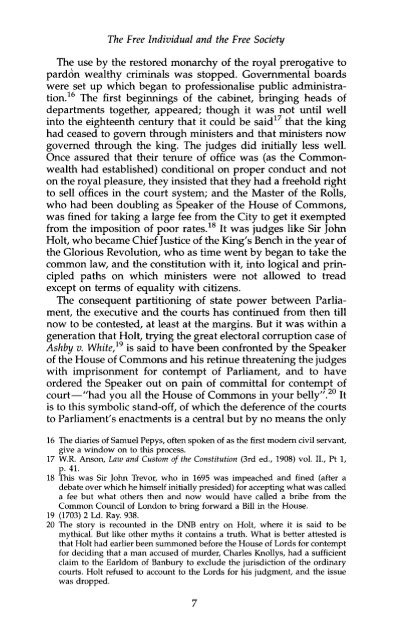LECTURES - College of Social Sciences and International Studies ...
LECTURES - College of Social Sciences and International Studies ...
LECTURES - College of Social Sciences and International Studies ...
You also want an ePaper? Increase the reach of your titles
YUMPU automatically turns print PDFs into web optimized ePapers that Google loves.
The Free Individual <strong>and</strong> the Free Society<br />
The use by the restored monarchy <strong>of</strong> the royal prerogative to<br />
pardon wealthy criminals was stopped. Governmental boards<br />
were set up which began to pr<strong>of</strong>essionalise public administration.<br />
16 The first beginnings <strong>of</strong> the cabinet, bringing heads <strong>of</strong><br />
departments together, appeared; though it was not until well<br />
into the eighteenth century that it could be said 17 that the king<br />
had ceased to govern through ministers <strong>and</strong> that ministers now<br />
governed through the king. The judges did initially less well.<br />
Once assured that their tenure <strong>of</strong> <strong>of</strong>fice was (as the Commonwealth<br />
had established) conditional on proper conduct <strong>and</strong> not<br />
on the royal pleasure, they insisted that they had a freehold right<br />
to sell <strong>of</strong>fices in the court system; <strong>and</strong> the Master <strong>of</strong> the Rolls,<br />
who had been doubling as Speaker <strong>of</strong> the House <strong>of</strong> Commons,<br />
was fined for taking a large fee from the City to get it exempted<br />
from the imposition <strong>of</strong> poor rates. 18 It was judges like Sir John<br />
Holt, who became Chief Justice <strong>of</strong> the King's Bench in the year <strong>of</strong><br />
the Glorious Revolution, who as time went by began to take the<br />
common law, <strong>and</strong> the constitution with it, into logical <strong>and</strong> principled<br />
paths on which ministers were not allowed to tread<br />
except on terms <strong>of</strong> equality with citizens.<br />
The consequent partitioning <strong>of</strong> state power between Parliament,<br />
the executive <strong>and</strong> the courts has continued from then till<br />
now to be contested, at least at the margins. But it was within a<br />
generation that Holt, trying the great electoral corruption case <strong>of</strong><br />
Ashby v. White, 19 is said to have been confronted by the Speaker<br />
<strong>of</strong> the House <strong>of</strong> Commons <strong>and</strong> his retinue threatening the judges<br />
with imprisonment for contempt <strong>of</strong> Parliament, <strong>and</strong> to have<br />
ordered the Speaker out on pain <strong>of</strong> committal for contempt <strong>of</strong><br />
court—"had you all the House <strong>of</strong> Commons in your belly". 20 It<br />
is to this symbolic st<strong>and</strong>-<strong>of</strong>f, <strong>of</strong> which the deference <strong>of</strong> the courts<br />
to Parliament's enactments is a central but by no means the only<br />
16 The diaries <strong>of</strong> Samuel Pepys, <strong>of</strong>ten spoken <strong>of</strong> as the first modern civil servant,<br />
give a window on to this process.<br />
17 W.R. Anson, Law <strong>and</strong> Custom <strong>of</strong> the Constitution (3rd ed., 1908) vol. II., Pt 1,<br />
p. 41.<br />
18 This was Sir John Trevor, who in 1695 was impeached <strong>and</strong> fined (after a<br />
debate over which he himself initially presided) for accepting what was called<br />
a fee but what others then <strong>and</strong> now would have called a bribe from the<br />
Common Council <strong>of</strong> London to bring forward a Bill in the House.<br />
19 (1703) 2 Ld. Ray. 938.<br />
20 The story is recounted in the DNB entry on Holt, where it is said to be<br />
mythical. But like other myths it contains a truth. What is better attested is<br />
that Holt had earlier been summoned before the House <strong>of</strong> Lords for contempt<br />
for deciding that a man accused <strong>of</strong> murder, Charles Knollys, had a sufficient<br />
claim to the Earldom <strong>of</strong> Banbury to exclude the jurisdiction <strong>of</strong> the ordinary<br />
courts. Holt refused to account to the Lords for his judgment, <strong>and</strong> the issue<br />
was dropped.

















